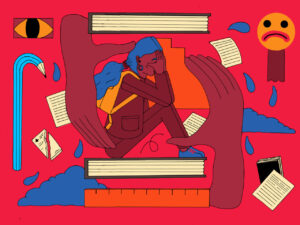
It’s been over two weeks since citizens across the world were told to “social distance,” meaning zero physical contact with others.
COVID-19 caused universities across the country to shut down and move classes to online, leaving students to work and learn from home.
But are students able to balance their work and mental health?
“I’m not worried about school right now. I’m worried about if our government knows what it’s doing,” Maurice Gilbert said.
Gilbert is a sophomore political science and economics student at Florida A&M University. Gilbert is worried about the actions the U.S. government will take to prevent the pandemic from becoming worse than it already is.
According to Worldometers.info, there have been 3,889 deaths in the United States as of Tuesday.
Relatives of the deceased are unable to grieve properly due to social distancing. It also prevents families from visiting newborns and healthcare professionals from being with their loved ones.
“But we are really in trouble if we don’t get it together. And I’m supposed to focus on class,” Gilbert added.
Nearly everyone across the world is left without a choice but to stay in their homes.
On a college campus, it’s normal for students to experience stress, feeling overwhelmed and seeking resources to help with their issues. From counseling services, to hanging with friends to interacting with professors, all of that is shut down as a result of COVID-19.
Byran Llerandi is a graduating senior political science student at FAMU. “It sucks my grandparents are pretty old so for them not to see me walk hurts a little, but it is what it is,” Llerandi said.
Llerandi seems to be fine, but he said he’s lost all motivation to do work. He feels that not only is his mental health at risk, but his physical health as well.
“The fact that housing is making the RAs work is ridiculous, also poses a lot of risk,” Llerandi said.
He explains how if a resident returns from out of town or needs to be checked out, that the resident poses a risk to resident assistants.
FAMU Housing is closing on April 6 and only students with extenuating circumstances are permitted to stay.
According to Psychiatric Times, “College students are uniquely vulnerable to both everyday stressors and severe mental illness, and psychiatric symptoms among college students appear to be on the rise.”
Some of the issues named by Psychiatric Times were food insecurities, local businesses closing, lack of well resourced families and the cancellation of special ceremonies like graduation.
All of these events being canceled or postponed takes a toll on students throughout their day to day routine.
Lawrencia Palmer, a freshman political science student at FAMU, moved out of her residence hall and returned home to Los Angeles amid pandemic worries. She’s having a hard time adjusting with the time change between California and her Florida classes, as well her focus now that classes are online.
“It really has been difficult to adjust and much harder to focus than I thought. It ends up making me frustrated that I can’t get focused as well which contributed to the problem,” Palmer said.
She describes her experience so far as a “circulation of anxiety.” Palmer has tried to adjust her academic schedule to mirror the one she would follow on campus by studying in a quiet setting and reading books for some kind of motivation.
Students across the campus seem shook up about their next steps while facing this pandemic. Even professors are concerned about the wellbeing and mental health of their students.
FAMU alum Demetrius Smith is a political science professor at Valencia College and Hillsborough Community College online. He firmly believes that FAMU professors help who wants to be helped and he wants to provide that same experience for his students, even through he worries.
“These are [students] you want to see do well and help as much as possible so I’m constantly worrying about them. Do they have a book, internet, food,” he said.
Smith gave out his number to students and receives nearly 80 emails from students trying to figure out what to do in and out of the classroom.
“Emotionally it’s tough because you get to know students and now you don’t get to see them,” Smith said.
Smith mentioned that many of his students work at the attractions near the college, which also leaves them without a steady income at this time.
The pandemic has brought many fears to students, weighing on top of their academics, living situations and job placements.
“Not knowing when this is going to be over makes me feel lost because I haven’t the slightest idea of when I’ll be able to plan the stages of my life,” said Dashae’ Coley-Epps, a sophomore English student at FAMU.
Epps said she has mixed feelings about the current state of the world.
Overall, COVID-19 has caused social distancing to be extended to April 30, and it is projected to last many weeks after that date. The impact on students’ mental health is a major issue and only time will determine how much longer they’re going to be kept indoors.